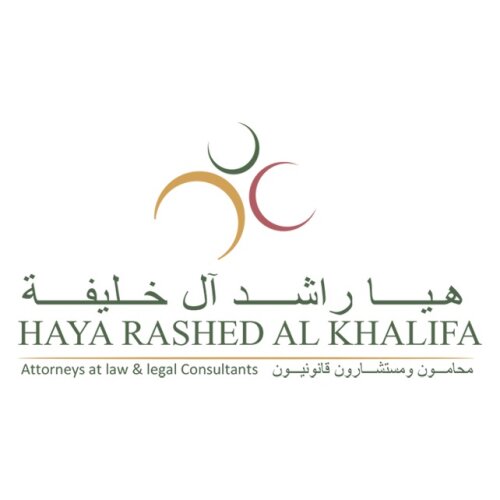Best Inheritance Law Lawyers in Bahrain
Share your needs with us, get contacted by law firms.
Free. Takes 2 min.
Or refine your search by selecting a city:
List of the best lawyers in Bahrain
1. About Inheritance Law in Bahrain
Inheritance matters in Bahrain are largely guided by Sharia based rules for Muslims, applied through Bahraini courts. These rules specify fixed shares for certain heirs and govern how a deceased person’s assets are distributed. Non-Muslims may have different treatment, typically interacting with civil procedures and wills where applicable.
In practice, Bahraini inheritance issues involve probate, estate administration, and the settlement of debts before distribution to heirs. Local courts oversee these processes, and guardianship provisions may come into play when minors are involved. The interplay between Sharia principles and civil procedure shapes most estate matters in Bahrain.
Understanding who may inherit, how shares are calculated, and what documentation is required can prevent delays. Working with a Bahraini advocate or legal counsel helps ensure compliance with local rules and timelines. For residents and expatriates alike, clear estate planning reduces risk of disputes after death.
Inheritance in Bahrain for Muslims is governed by Sharia inheritance rules, with fixed shares for certain heirs (faraid).
Source: Legislation Portal Bahrain
The government notes that personal status and family law matters, including inheritance, are handled by the courts and relevant regulatory bodies.
Source: Bahrain Government Portal
2. Why You May Need a Lawyer
In Bahrain, several concrete scenarios often require legal counsel to navigate inheritance issues efficiently and lawfully. Below are real-world contexts where an advocate can add measurable value.
- Disputes over fixed shares among heirs after a parent’s death where a surviving spouse, daughters, or other relatives challenge allocations under faraid.
- Unclear or contested wills involving expatriates or mixed-faith families, where the will may conflict with Sharia inheritance rules.
- Guardianship and administration for minors when the deceased leaves minor children and an appointed guardian or administrator is needed to manage assets.
- Cross-border estates with assets in Bahrain and abroad, raising issues of recognition, jurisdiction, and double probate requirements.
- Debt settlement before distribution where the estate must pay outstanding debts and taxes before heirs receive shares.
- Foreign wills or assets with Bahraini registered property requiring local probate steps to transfer titles or ownership.
3. Local Laws Overview
Sharia Inheritance Principles (Faraid)
In Bahrain, Sharia inheritance rules determine how assets pass to heirs when the deceased is Muslim. The shares are fixed by law, with male heirs typically receiving a portion that is double a female heir in certain situations. These rules are applied by Bahraini courts through personal status proceedings.
Understanding faraid requires precise documentation, including death certificates, proof of relationship, and asset lists. Legal counsel helps examine whether a will aligns with Sharia shares or if courts must apply statutory presumptions. A lawyer also assists with calculating and verifying shares before distribution.
Civil Code and Probate Procedures
Where civil law governs non-Muslim cases or contingent civil probate matters, Bahraini procedural rules apply to estate administration. The court may appoint an administrator to manage estate assets and oversee debt payment. Legal counsel can prepare petitions, inventories, and order necessary registrations for title transfers.
Probate in Bahrain typically involves submitting death certificates, a list of assets, and heir identities to the competent court. Executors or administrators must publicize notices and resolve creditors’ claims. A local advocate helps ensure filings meet statutory timelines and form requirements.
Recent Changes and Trends
Be aware that Bahrain has pursued digitalization and streamlining of certain civil procedures in recent years. Online services and centralized case tracking have gradually improved efficiency in probate matters. Consult a Bahraini solicitor to confirm the latest procedural requirements for your case.
Trends include greater cross-border collaboration on inheritance matters and an emphasis on clarifying guardianship and custodianship provisions for minors. A licensed advocate can guide you through any new forms or electronic filing rules. Always verify changes with official portals before filing.
4. Frequently Asked Questions
What is the first step to start inheritance proceedings in Bahrain?
The initial step is to identify the competent court and retain a Bahraini advocate. You will gather death certificates, identity documents, and asset lists. An attorney can guide you through filing and deadlines.
Tip: Call the court’s probate division or check the official portal for required forms before visiting in person.
How is the fixed share calculated under faraid in Bahrain?
Fixed shares depend on the deceased’s family, such as spouse, children, and parents. A legal counsel calculates shares using family tree and asset details. If disputes arise, the court will interpret the shares under Sharia rules.
When should I hire a Bahraini inheritance lawyer?
Hire a lawyer as soon as a death occurs or a dispute arises. Early involvement helps preserve assets and reduce delays. A lawyer also helps with proper documentation and compliance with deadlines.
Where do I file an inheritance case in Bahrain?
Inheritance cases are filed in the competent Bahraini court that handles personal status matters. Your advocate will determine the proper venue based on the heirs and asset location. Court staff can provide filing instructions.
Why do I need a will in Bahrain if Sharia rules apply?
A will can address non-Sharia issues such as debts, business interests, or assets outside standard shares. It may also help with cross-border assets and minimize disputes. A lawyer can draft a will consistent with Bahraini law.
Can a non-Muslim estate be restricted by Muslim heirs in Bahrain?
Yes, for assets in Bahrain, Muslim heirs may have fixed shares if the deceased is Muslim. Non-Muslim co-heirs or foreign nationals may be subject to civil procedures for parts of the estate. Legal counsel clarifies applicable rules for each asset.
Should I use a Bahraini advocate or a foreign-licensed attorney?
Use a Bahraini advocate for local proceedings and court familiarity. A Bahraini attorney understands local rules, witnesses, and procedural requirements better. You may still consult foreign-licensed counsel for cross-border matters.
Do I need to be a Bahraini resident to file probate?
Residence is not always required to initiate probate, but local presence can simplify service and filing. An advocate can advise on residency implications and service requirements. Local representation is usually recommended.
Do I need witnesses or a will in Bahrain?
Proving a will and establishing heirs typically requires witnesses and notarized documents. Inheritance proceedings rely on court filings and official records. A lawyer helps secure compliant witness testimony and proper notarization.
How much does it cost to hire an inheritance lawyer in Bahrain?
Costs vary by case complexity and asset scope. Expect consultation fees, filing fees, and potential success fees. Ask for a written estimate and fee schedule before engagement.
How long does probate take in Bahrain?
Typical timelines range from several months to over a year depending on complexity, asset location, and disputes. A lawyer can provide a case-specific timeline after reviewing the files. Delays often occur with outstanding debts or contested shares.
Is it possible to contest a will in Bahrain?
Yes, a will can be contested if it violates Sharia shares, is forged, or lacks proper execution. A Bahraini advocate can advise on grounds for contest and represent you in court. Timely action is essential to protect your interests.
What's the difference between an executor and administrator in Bahraini law?
An executor carries out the deceased's will if one exists. An administrator handles estate matters when there is no will or the executor cannot act. Courts appoint administrators for proper asset management.
5. Additional Resources
- - Official repository for Bahraini laws and decrees, including inheritance related provisions. legislation.gov.bh
- - Government body overseeing justice, family law, personal status matters, and court administration in Bahrain. moj.gov.bh
- - Central hub for public services, court coordination, and guidance on civil status and inheritance procedures. gov.bh
6. Next Steps
- Identify your asset and heir profile Gather the death certificate, will (if any), asset list, debts, and kinship documents. Complete copies improve accuracy. Aim to collect everything within 2 weeks.
- Find a Bahraini advocate Search for an advocate or legal counsel with inheritance experience. Request a scope of work, hourly rate, and estimated total costs. Schedule initial consultation within 1 week.
- Have a preliminary case assessment Your lawyer reviews faraid implications, civil procedures, and cross-border assets. Expect a 2-3 page summary with recommended steps within 5 business days.
- Choose filing strategy Decide whether to pursue Sharia-based probate or civil probate routes. Prepare any necessary wills or guardianship documents. Begin filing within 1-2 weeks after assessment.
- Prepare and file required documents Work with your lawyer to assemble IDs, kinship proofs, asset inventories, and debt statements. Submit to the appropriate Bahraini court with your advocate by your side within 2-4 weeks.
- Attend hearings and respond to requests Attend court sessions or remote hearings as required. Your counsel handles evidence, witnesses, and procedural requests. Expect follow-up tasks for several months.
- Monitor estate clearance and transfers Ensure asset transfers, title changes, and debt settlements are completed after court orders. Confirm with asset holders (banks, property registries) and your lawyer.
Lawzana helps you find the best lawyers and law firms in Bahrain through a curated and pre-screened list of qualified legal professionals. Our platform offers rankings and detailed profiles of attorneys and law firms, allowing you to compare based on practice areas, including Inheritance Law, experience, and client feedback.
Each profile includes a description of the firm's areas of practice, client reviews, team members and partners, year of establishment, spoken languages, office locations, contact information, social media presence, and any published articles or resources. Most firms on our platform speak English and are experienced in both local and international legal matters.
Get a quote from top-rated law firms in Bahrain — quickly, securely, and without unnecessary hassle.
Disclaimer:
The information provided on this page is for general informational purposes only and does not constitute legal advice. While we strive to ensure the accuracy and relevance of the content, legal information may change over time, and interpretations of the law can vary. You should always consult with a qualified legal professional for advice specific to your situation.
We disclaim all liability for actions taken or not taken based on the content of this page. If you believe any information is incorrect or outdated, please contact us, and we will review and update it where appropriate.
Browse inheritance law law firms by city in Bahrain
Refine your search by selecting a city.









